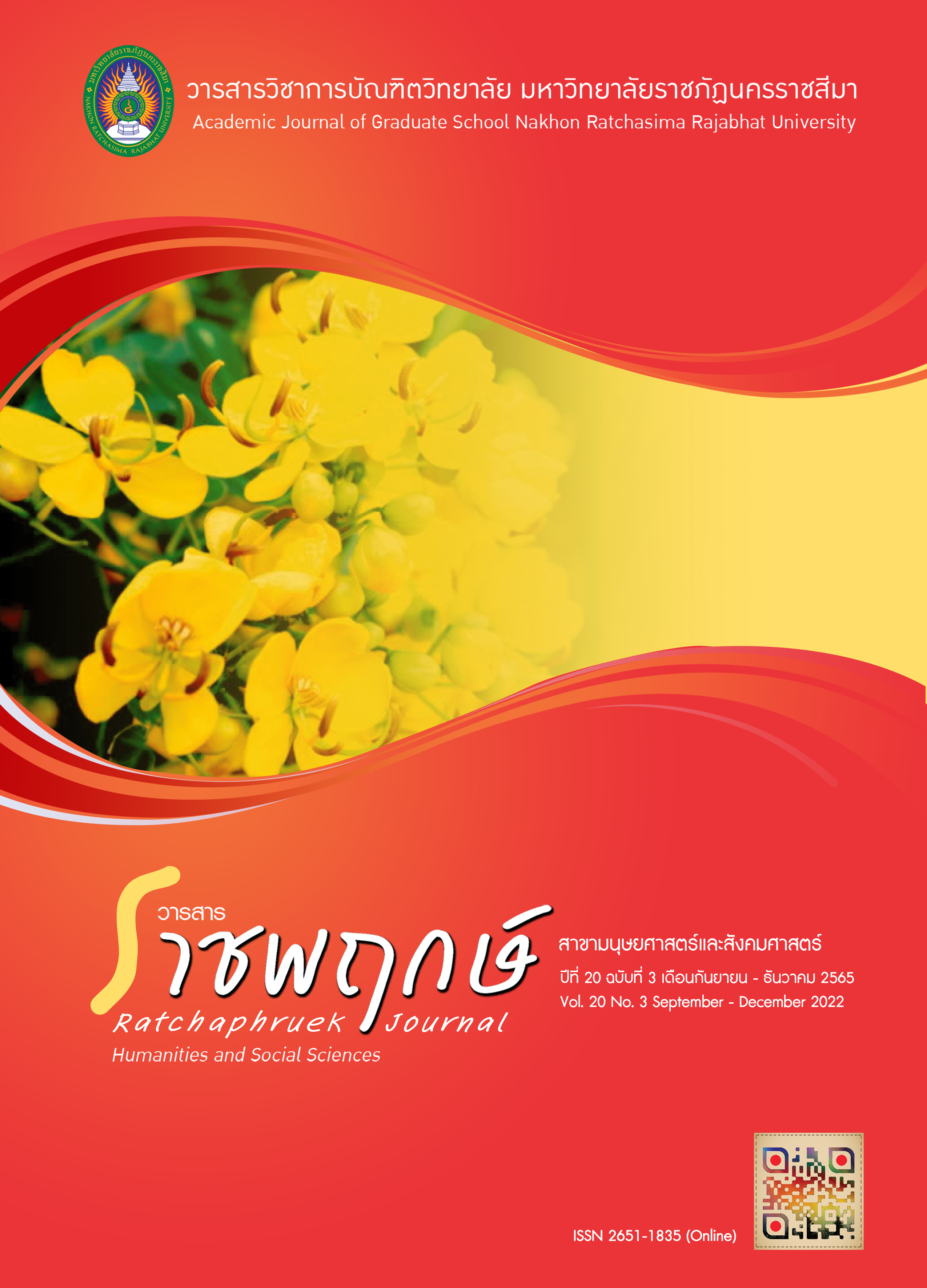A Study of Innovative Leadership of School Administrators Affecting Digital Citizenship of Teachers Under the Secondary Educational Service Area Office Bangkok 1
Main Article Content
Abstract
The purposes of this research were to study: 1) The level of the innovative leadership of school administrators and the level of the digital citizenship of teachers; 2) The relationship between the innovative leadership of school administrators and the digital citizenship of teachers; and 3) The innovative leadership of school administrators affecting the digital citizenship of teachers. The samples in this research were 357 teachers under the secondary educational service area office Bangkok 1. The research instrument used in the was a 5-level estimation scale questionnaire. Data were analyzed by mean and standard deviation. The tests of hypothesis used Pearson product-moment correlation coefficient, multiple correlation and Multiple Regression Analysis-Enter Method. The research results were found that: (1) The overall innovative leadership of the school administrators was at a high level, and when considering each aspect It was found that it was at a high level in all aspects; (2) The digital citizenship of teachers as a whole was at a high level, when considering each aspect It was found that it was at a high level in all aspects; and (3) Innovative leadership of school administrators was related to teachers' digital citizenship and could statistically predicted teachers' digital citizenship at the .01 level of significance.
Article Details

This work is licensed under a Creative Commons Attribution-NonCommercial-NoDerivatives 4.0 International License.
References
กิตติพิชญ์ วรโชติสุพัฒภาคิน. (2562). แนวทางพัฒนาบทบาทการศึกษาต่อการเสริมสร้างความเป็นพลเมืองดิจิทัลสู่ทักษะการคิดเชิงนวัตกรรม. วารสารการศึกษาและการพัฒนาสังคม, 15(2), น. 327-341.
จีราภา ประพันธ์พัฒน์. (2560). การศึกษาภาวะผู้นำเชิงนวัตกรรมของผู้บริหารสถานศึกษา ตามความคิดเห็นของครู สังกัดสำนักงานเขตพื้นที่การศึกษาประถมศึกษาปทุมธานี (วิทยานิพนธ์มหาบัณฑิต, มหาวิทยาลัยเทคโนโลยีราชมงคลธัญบุรี).
ชัยเสฏฐ์ พรหมศรี. (2561). ภาวะผู้นำสำหรับผู้บริหารองค์การ: แนวคิด ทฤษฎีและกรณีศึกษา. กรุงเทพฯ: ปัญญาชน.
ฐิตินันท์ นันทะศรี. (2563). การพัฒนาตัวบ่งชี้ภาวะผู้นำเชิงนวัตกรรมของผู้บริหารสถานศึกษา สังกัดสำนักงานเขตพื้นที่การศึกษาประถมศึกษาในภาคตะวันออกเฉียงเหนือ (วิทยานิพนธ์ดุษฎีบัณฑิต, มหาวิทยาลัยราชภัฏสกลนคร).
ต้องลักษณ์ บุญธรรม. (2559). การเป็นผู้นำยุคเศรษฐกิจดิจิทัลกับการพัฒนาที่ยั่งยืนขององค์กรทางการศึกษา. วารสารวิชาการครุศาสตร์อุตสาหกรรม พระจอมเกล้าพระนครเหนือ, 7(1), น. 217-226.
ภมรวรรณ แป้นทอง. (2561). สมรรถนะของผู้บริหารสถานศึกษาที่ส่งผลต่อประสิทธิผลการเรียนรู้แบบดิจิทัลในสถานศึกษา สังกัดสำนักงานเขตพื้นที่การศึกษาประถมศึกษาเพชรบุรี เขต 2 (วิทยานิพนธ์มหาบัณฑิต, มหาวิทยาลัยราชภัฏเพชรบุรี).
วรพจน์ วงศ์กิจรุ่งเรือง. (2561). คู่มือพลเมืองดิจิทัล. กรุงเทพฯ: สำนักงานส่งเสริมเศรษฐกิจดิจิทัล กระทรวงดิจิทัลเพื่อเศรษฐกิจและสังคม.
วัชรพงศ์ ทัศนบรรจง. (2563). ภาวะผู้นำเชิงนวัตกรรมของผู้บริหารที่ส่งผลต่อประสิทธิผลของสถานศึกษาในโครงการโรงเรียนประชารัฐ สังกัดสำนักงานเขตพื้นที่การศึกษาประถมศึกษาสมุทรสงคราม (วิทยานิพนธ์มหาบัณฑิต, มหาวิทยาลัยราชภัฏนครปฐม).
เวียงวิวรรธน์ ทำทูล. (2557). ภาวะผู้นำเชิงนวัตกรรมของผู้บริหารสถานศึกษาที่ส่งผลต่อองค์การขีดสมรรถนะสูงของโรงเรียนในสังกัดสำนักงานเขตพื้นที่การศึกษามัธยมศึกษา เขต 21 (วิทยานิพนธ์มหาบัณฑิต, มหาวิทยาลัยขอนแก่น).
สำนักงานคณะกรรมการการศึกษาขั้นพื้นฐาน. (2563). นโยบายสำนักงานคณะกรรมการการศึกษาขั้นพื้นฐาน ปีงบประมาณ พ.ศ. 2564-2565. สืบค้นเมื่อ 10 ธันวาคม 2564, จาก https://www.kruachieve.com/wp-content/uploads/2020/12/04006_ว4975-นโยบาย-สพฐ.pdf
สุกัญญา แช่มช้อย. (2561). การบริหารสถานศึกษาในยุคดิจิทัล = School management in digital era. กรุงเทพฯ: จุฬาลงกรณ์มหาวิทยาลัย.
โสภิดา วีรกุลเทวัญ. (2561). เท่าทันสื่อ: อำนาจในมือพลเมืองดิจิทัล. กรุงเทพฯ: สถาบันสื่อเด็กและเยาวชน.
Cronbach, L. J. (1990). Essentials of psychological testing (5th ed.). New York: Harper Collins.
Higgins, J. M. (1995). Innovate or evaporate: Test & improve your organization IQ-its innovation quotient. New York: New Management.
Horth, D. & Buchner, D. (2014). Innovative Leadership: How to use innovation to lead effectively, work collaboratively, and drive results. Retrieved December 10, 2021, from https://imamhamzatcoed.edu.ng/library/ebooks/resources/
Innovation_Leadership_by_david_horth.pdf
Horth, D. M. (2012). Becoming a leader who fosters innovation. Baffles: Guildford & King Lynn.
International Society for Technology in Education. (2007). National Education Technology Standards for Students: The Next Generation (2nd ed.). Eugene. Oregon: Author.
International Society for Technology in Education. (2008). National Educational Technology Standards for Teachers 2008. Retrieved December 10, 2021, from https://people.umass.edu/pelliott/reflections/netst.html
Krejcie, R. V. & Morgan, D. E. (1970). Determining sample size for research activities. Journal Education and Psychological Measurement, 30(3), pp. 608-609.
Pollock, A. (2008). Pharmaceutical meaning-making beyond marketing: Racialized subjects of generic thiazide. Belmont, CA: Cengage/Wadsworth.
Quinn, J. B. (1991). Managing Innovation: Controlled Chaos. Harvard Business Review, 63(3), pp. 17-28.
Ribble, M. (2006). Implementing digital citizenship in schools: The research, development and validation of a technology leader's guide. Retrieved December 10, 2021, from https://www.learntechlib.org/p/129717/
Ribble, M. (2011). Digital citizenship in school. Eugne, Oregon: The International Society for Technology in Education.


